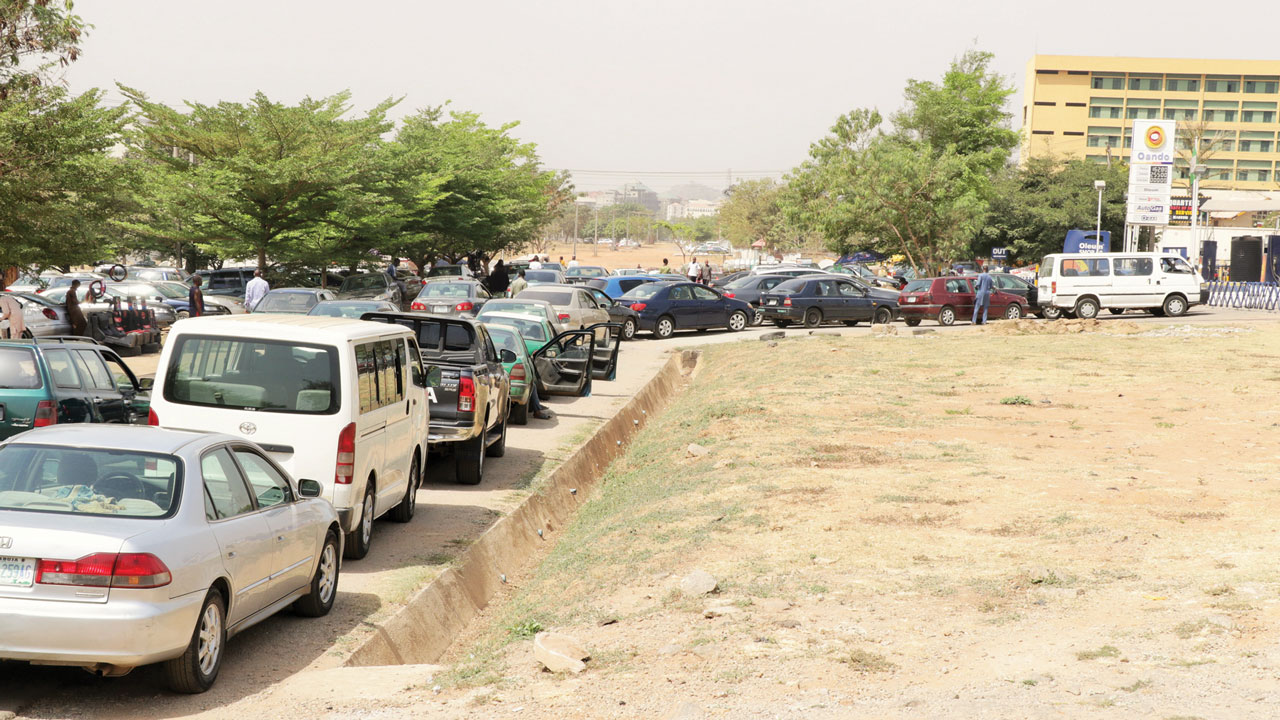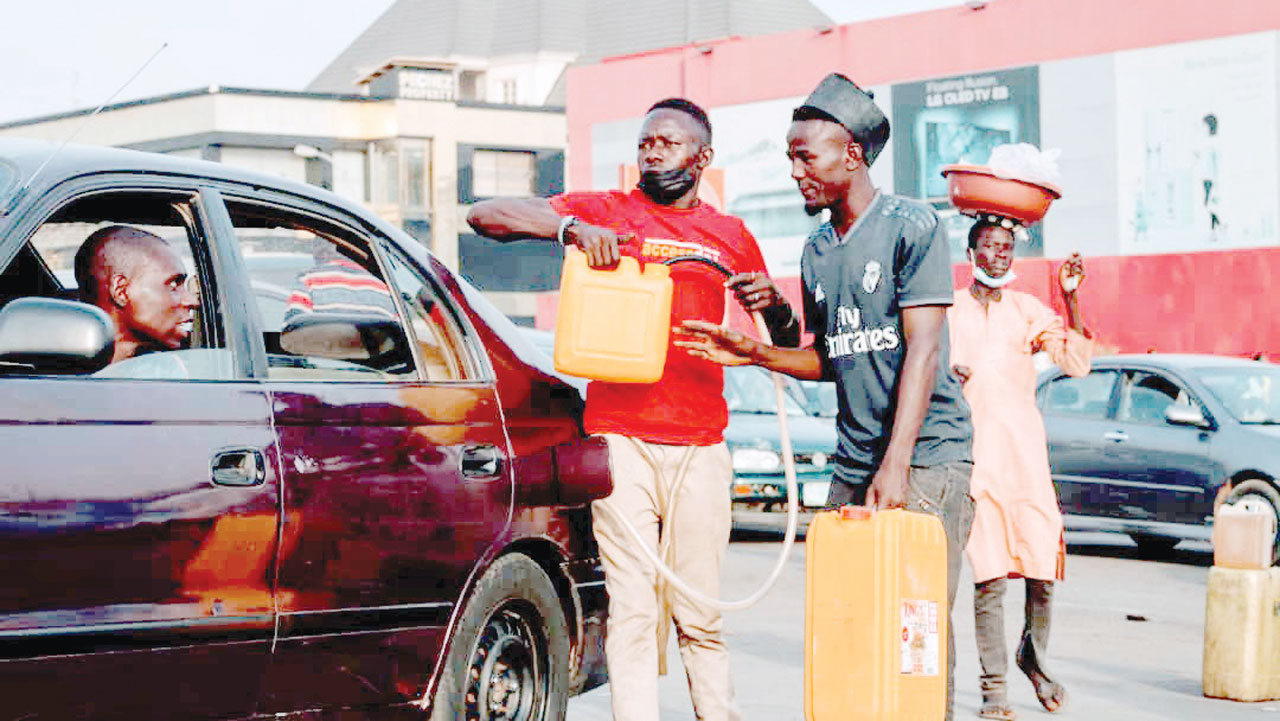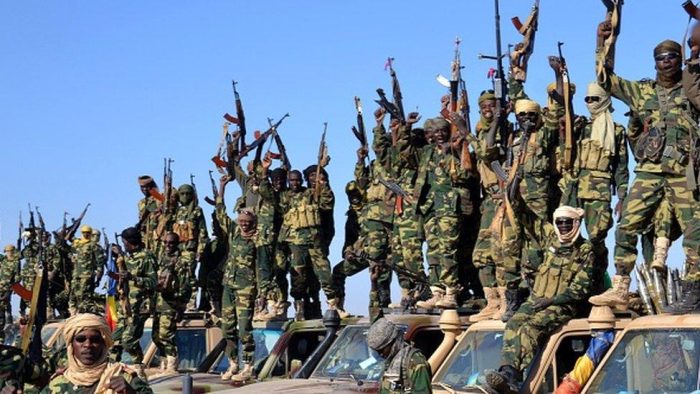
PHOTO: PHILIP OJISUA
• Smuggling, hoarding return as marketers groan
• Govt inconsistency, backpedaling responsible for chaos, says Faniran
Nigerians across regions, yesterday, lamented scarcity of petrol and the attendant price hike.
Motorists and commuters have resorted to panicky measures to secure the product.
Uncertainties, intrigues and the face-off between Federal Government and labour unions may have created an avenue for some marketers of Premium Motor Spirit (PMS) or petrol to return to smuggling or hoarding as Nigeria’s daily consumption witnessed over 25 million litre surge.
With petrol selling for an average of N400 per litre in neigbouring countries, there are indications marketers have returned to smuggling or hoarding products in anticipation of price increase, which would enable them make arbitrary gain.
That singular act has returned petrol queues and upsurge in the activities of black marketers across the country as well as over N62 billion monthly subsidy.
The current crisis followed a supposed exit from payment of subsidy, which was announced in March last year and the eventual deregulation of the downstream sector. Under the arrangement, the control of pump price is expected to be determined by market forces, especially crude oil price and exchange.
Labour unions, especially the Nigerian Labour Union and the Trade Union Congress, which couldn’t stand the speed at which the pump price was heading as crude oil price rebalances at the international market had held government by the throat after succeeding in reducing the price from N167 to N162 per litre.
The current crisis is despite assurance by the Group General Manager, Group Public Affairs Division, Dr. Kennie Obateru,that the Corporation was not contemplating any raise in the price of petrol in March in order not to jeopardis e ongoing engagements with organised labour and other stakeholders on an acceptable framework that would not expose the ordinary Nigerian to any hardship.
He equally cautioned petroleum products marketers not to engage in arbitrary price increase or hoarding of petrol so as not to create artificial scarcity and unnecessary hardship for Nigerians.
The Independent Petroleum Marketers Association of Nigeria (IPMAN), which has closed down a lot of their stations had told The Guardian that the queues may linger as there is already scarcity of petrol in most private depots while the ex-depot price, which was last week at N158 has gone up to N167.
Vice President of IPMAN, Abubakar Shettima said the marketers who paid for products at the depot could not even take delivery over the situation.
Professor of Petroleum Economics and Policy Research, Omowumi Iledare, insisted that prices of petroleum products at the pump must remain a commercial decision not a policy decisions.
“NNPC is a commercial institution with the public as its stakeholder. On the other hand, price deregulation or control is a public policy decision with implications for market efficiency and equity. So let there be public education on the inevitability for a sustainable Nigeria oil and gas sector,” Iledare said.
An energy expert with FOSTER, Micheal Faniran, linked the long queues to hoarding by marketers given the speculation on possible pump price increase as well as panic buying by consumers.
“With the declaration by NNPC, who happens to be the sole importer currently, I expect the queues to disappear in the coming days until when speculation arises again,” he noted.
Faniran disclosed that communication would manage the current issues, adding that since government announced recently that price would go up as the crude price rises, backpedaling that there won’t an increase creates speculation.
“These inconsistencies are the cause of what we are witnessing currently. We do not have an option but to deregulate the downstream sector once and for all. Delay is just postponing the evil day. The more we delay total deregulation, the more money the economy is losing to subsidy payments,” he noted.
Former President of Chartered Institute of Bankers of Nigeria (CIBN) and a lecturer of economics at Babcock University Professor Segun Ajibola said there was need for the government to make local refineries work to meet local demand for refined products.
“It is embarrassing that Nigeria has three major refineries that have turned moribund hence we keep devoting the scarce foreign exchange towards importation of refined products,” adding: “Let’s divert the foreign exchange towards the turnaround maintenance of the refineries band become self-sufficient in meeting local demand for refined products. If Nigeria lacks the local capacity to manage the refineries let’s engage technical partners for that purpose.”
An energy lawyer, Madaki Ameh described the country’s present situation as disastrous failure on the part of the current government, caused by having round pegs in square holes.

Ameh believes that the current Minister of State for Petroleum Resources, has no oil and gas knowledge or experience, stressing that some key Ministries and Departments of Government must not be manned by people with little or zero knowledge of the industry.
“The challenges of pricing of products will remain with us until government is prepared to do the right things and implement the right policies in the entire value chain from the upstream, through the midstream to the downstream. The oil and gas industry and the power sectors are poorly managed,” he said.
FEDERAL Capital Territory (FCT) residents told The Guardian yesterday they were grappling with over 100 per cent hike in cost of transportation within and around the Abuja metropolis, a situation many described as unfortunate and inhuman.
A barber at the Wuse neighbourhood, Mr. Wale Oke, said: ‘’I was told yesterday night that queue had returned to our filling stations, I was alarmed but what can I do, I informed my wife to assist me with a N1,500 for transport fare to Wuse, I’m not even sure of eating there today, our government is becoming wicked on a daily basis, all I know is that all these will soon end.’’
A close look at fares in and around the territory revealed that commuters from Suleja to Abuja city presently pay asw much as N500,00 as against the former N300,00 transport fare. Also commuters travelling from Abuja to Gwagwalada currently pay N300,00 as against the former N200,00 transport fares.
In Ibadan, the Oyo State capital, many commuters were stranded following the fuel situation. Commercial drivers and motorcyclists struggled to buy fuel.
Visits to many parts of the capital city revealed that some filling stations were shut while the others are besieged by long queues of motorcyclists, private and commercial drivers.
They complained of the stress and the distance they cover to get petrol, lamenting that the situation was affecting their business.
The motorists scrambled for fuel in most filling stations where the product was sold amid long queues.
This resulted in hike in transport fare as commercial transporters double the cost. The fare from Mokola to Iwo Road, which was N100 is became N150. From Wire and Cable to Oja Oba, which was N120 increased to N250. The same situation was obtained in many routes and places such as Sango, Bodija, Agodi Gate, Iwo Road, Monatan, Eleyele and Ologuneru.
A couple of major fuel marketers along the Ijokodo, Eleyele-Sango Road, including Total, Conoil and Oando were not dispensing.
A manager of a filling station in Mokola said supply was not regular. “What we heard is that there will be increase in price of petrol, that is why the supply is not regular because we do not know the price they will give dealers. We may embark on strike.”
However, some filling stations dispensed their products at the Apata, Odo Ona area as well as the Mobil filling station located at Awolowo Road, Bodija.
Filling stations along the Agodi Gate/Iwo Road, Ologuneru, Eleyele and Monatan are still experiencing long queues.
During peak hours on Monday as students, civil servants and business owners struggled to catch up with time, transporters engaged in brisk business as they made arbitrary charges.
A student, who gave her name as Sherifat Balogun, who paid N100 to Odo Ona from Apata, said, “I cannot understand what led to the increase in transport fare. My parents gave me N100 to and fro which means that I should be paying N50 to Odo Ona and N50 back.”
IN Lagos, two filling stations, Pedokoby Oil and Ibwas Oil & Gas, located at Mushin Road, Ile-Ewe Meta Isolo sold at N165 and N170 per litre to commercial drivers and private individuals with no queues.
A truck dealer, Aremu Akeem said: “We are buying for N170 which is not supposed to be. During Yar’adua’s time, we knew how much fuel cost. Does Buhari want commercial drivers to steal or beg before they feed their families? The price of fuel should be tagged at N100 so that the masses can be happy.”
Another transporter, Hamzat Anifowose, said with the current price, the government was making it hard for transporters to make money.
“I have been here since morning and that is how we may likely go home today without a penny. The government should have mercy on us and remember what they told us before they came into power. They should bring down the price and do all they can to make the dollar stronger.”
IN Rivers State, signs of fuel shortage started at the weekend when some filling stations in the city were brought under lock and key. Inquiries from station attendants revealed they had no products.
There were long queues at some major filling stations like Oando and NNPC at SARS Road in Obio/akpor Local Government Area of the State as they sold a litre of petrol for N165, thereby attracting more buyers while other private filling stations which were selling for N170 had no queue.
A motorist at the NNPC filling station at SARS road said: “We are really suffering in this country, it is difficult to get money these days; yet, when we managed to get it, we still queue to buy petrol at a very high price of N165 per litre, this is disheartening.”
Another resident at a private filling station along Ada George road, said the hike had become unbearable.
The DPR Port Harcourt Zonal Controller, Bassey Nkanya, said: “I’m not aware of any scarcity of petroleum products in Rivers State. My colleagues are on the routine surveillance exercise, they have not reported any scarcity.”
IN Ebonyi State, few stations that had products sold between 170 and 175 per litre.
The Guardian survey showed some stations were not selling because they didn’t have the product.
The check showed that Jacosem along Afikpo Road, RC filling station, AEMASOL and Total filling stations along Old Enugu Road, among others, were not selling.
NORTHERN states of Kano, Taraba, Kebbi, Plateau, Katsina experienced long queues at filling stations.
Besides the few stations seen in Maiduguri, many independent marketers had shut their stations.
A.A. Rano on Zaria road, Maikifi on Maiduguri road, Aliko on BUK road and other markets had since shut down, The Guardian observed.
Despite warnings by officials of the Department of Petroleum Resources (DPR), Kaduna Zone, that any marketer found hoarding fuel would be sanctioned, many stations in the metropolis did not attend to motorists, while few of them that dispensed had long queue of vehicles, particularly commercial buses.
Along Nnamdi Azikwe highway, many stations shut their gates. The Total filling station along Ahmadu Bello way and Mobil petrol station, Independence way, said they had exhausted their stock. Spokesman for the DPR, Kaduna Zone, Adamu Garba had warned independent petroleum marketers against hoarding in anticipation of increase in price.
Garba, who spoke with The Guardian against the backdrop of panic buying of the product by motorists said: “Our officials are already on inspection tour of various filling stations in the metropolis, anyone that is found hoarding the product will be visited with severe penalty by the Department.”
In Taraba, the prices of the product stood between N175 and N180, a situation that gave motorists and commuters great concern as they claimed it had led to increase in prices of other items.
A station manager, who spoke on condition of anonymity, said hoarding became necessary “because we heard that there are plans to increase the pump price.”
Disturbed by the development, the leadership of the state branch of the Department of Petroleum Resources (DPR) denied any ongoing plans in the country to hike the pump price.
Visits to some filling stations in Birnin Kebbi, Kebbi Stateshwed none opened.
A commercial driver Alhaji Hassan lamented the scarcity and appealed to government to intervene as it had already caused prices of goods to escalate.
In Jos, Plateau State, fuel price has hit N400 per litre in the black market despite efforts by NNPC to allay fears of increase in pump price.
Three operators in the market, who identified themselves as Abdul, Musa Chuwan, Abednego, confirmed the increase, saying: “We are not government workers who collect salaries every month. So, when an opportunity comes like this, we capitalise on it and we make our money once in a while. So, nobody should blame us because that is where we feed ourselves, families and other relations.”
Conoil filling station in Jos was closed because, according to the operators, they exhausted their stock on Sunday night.
AP Filling Station was also lnot open to customers as they said they sold what they had on Sunday night and closed till yesterday.
In Katsina State, stations closed earlier than usual, even as some stations have been under lock and key.
However, in Daura, President Muhammadu Buhari’s hometown, it was business as usual as filing stations located within the town, attended to customers with almost no queues.





